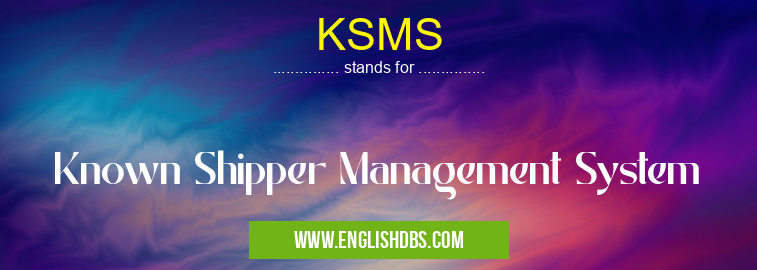What does KSMS mean in MANAGEMENT
KSMS stands for Known Shipper Management System. It is a system designed to enhance security in the shipping industry by ensuring that known and trusted shippers are identified and verified.

KSMS meaning in Management in Business
KSMS mostly used in an acronym Management in Category Business that means Known Shipper Management System
Shorthand: KSMS,
Full Form: Known Shipper Management System
For more information of "Known Shipper Management System", see the section below.
» Business » Management
What is a Known Shipper Management System?
KSMS is a database that contains information about shippers who have been vetted and approved by a regulatory authority. This information includes the shipper's name, address, contact information, and other relevant data.
Purpose of a KSMS
The primary purpose of a KSMS is to:
- Enhance security by verifying the identity and trustworthiness of shippers.
- Reduce the risk of terrorism and other illicit activities in the shipping industry.
- Streamline shipping processes by expediting the clearance of goods from known and trusted shippers.
Benefits of a KSMS
KSMS offers several benefits, including:
- Improved security: Enhanced security measures protect against potential threats.
- Reduced delays: Expedited clearance processes for verified shippers reduces delays.
- Simplified compliance: Adherence to regulations and standards is made easier.
- Increased efficiency: Streamlined processes improve overall efficiency in the shipping industry.
Essential Questions and Answers on Known Shipper Management System in "BUSINESS»MANAGEMENT"
What is Known Shipper Management System (KSMS)?
KSMS is a digital platform that facilitates the management of known shippers by air carriers and regulatory authorities. It enables the secure exchange of information and documentation related to shipper security, compliance, and risk assessment.
Why is KSMS important?
KSMS plays a crucial role in enhancing aviation security by providing a standardized and efficient process for vetting and monitoring known shippers. It helps air carriers identify and mitigate potential security risks associated with shipments, reduce the need for physical inspections, and streamline the cargo handling process.
What are the benefits of using KSMS?
KSMS offers several benefits, including:
- Enhanced security through improved risk assessment and mitigation
- Reduced physical inspections and delays
- Streamlined cargo handling
- Improved compliance with regulatory requirements
- Increased efficiency and cost savings for air carriers and shippers
How does KSMS work?
KSMS typically involves a two-step process:
- Shippers register and provide their security-related information and documentation to the KSMS platform.
- Air carriers access the platform to review shipper information, conduct risk assessments, and make determinations regarding their known shipper status.
Is KSMS mandatory?
The implementation of KSMS may vary depending on regulatory requirements and operational practices of individual air carriers and jurisdictions. It is recommended to consult with relevant authorities and industry guidelines for specific requirements.
How do shippers participate in KSMS?
Shippers seeking known shipper status typically need to complete the following steps:
- Register with the KSMS platform
- Submit security-related information and documentation
- Undergo a security assessment
- Comply with ongoing security requirements as established by air carriers and regulatory authorities
Final Words: KSMS plays a vital role in enhancing security in the shipping industry. By identifying and verifying known shippers, it reduces the risk of illicit activities and streamlines shipping processes. As a result, KSMS contributes to the safe and efficient movement of goods worldwide.
